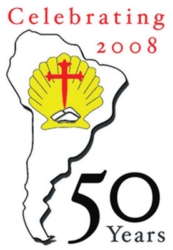St. Paul the missionary
Pope Benedict sought to honor St. Paul, “the apostle of the nations,” by dedicating the entire year beginning on his feast day on the 28th of June 2008, the 2000 anniversary of the saint’s birth. Following his conversion from Judaism, he became the apostle of the Gentiles that led him to make three missionary journeys. He divided his time between evangelizing, establishing churches and writing letters, and died a martyr death for the faith in Rome.
St. Paul’s legacy continues to inspire us and not least the members of the Society of St. James the Apostle. During the month of November we also call to mind the memories of those missionaries who have followed the footsteps of St. Paul, some who have now gone before us.
There are many aspects of St. Paul’s life and mission that one might focus on but I would like to single out for special attention on the identity of who Jesus was, his willingness to be led by the Spirit, and his respect for the culture of those he came to evangelize.
The historical reality of Jesus was fundamental to Paul’s teaching in his epistles. He was impressed by Jesus’ commitment to his divine mission, his gentleness and kindness in serving others, which involved the ideal in his self-sacrificing love of voluntarily giving his life for us. Moreover, he demanded the same high standards of obedience from the followers of Jesus. In summary, “bear with one another’s burdens and so fulfill the law which is Christ.” (Gal.6.2)
St. Paul, ever since the day of his conversion when he was prayed over by Ananias, became filled with the Holy Spirit. From then on he was convinced that he could, “live by the Spirit” and put this belief into practice throughout the remaining period of his Christian life. He began his mission in Antioch where Jewish Christians had fled after the martyrdom of Stephen at the invitation of Barnabas. There he spent two years building up the Church.
Inspired by the Holy Spirit and the blessings of the leaders of the Church of Jerusalem, he set sail on his first missionary journey. He made several stops on the way: Pisidian Antioch, Iconium, Lystra, and Derbe all cities on the island of Cyprus, and what is now known as modern Turkey. On the Sabbath they would go to the local synagogue where there was an opportunity to preach. Instead of focusing on Old Testament teachings for its own sake, they spoke about the promised Messiah. Gradually they formed small communities consisting of both Jews and Gentiles where they were taught about prayer, baptism, and occasionally celebrating the Eucharist. There were times when they suffered violent opposition.
Returning to Antioch they related the success story of the work of the Spirit. There was a negative reaction from some of the Jewish believers in Jerusalem towards Gentiles for not first becoming Jewish converts through circumcision, and the practice of the Torah. Paul and Barnabas defended the culture of the Gentiles which was hammered out at the first Council of the Church held at Jerusalem. Peter, the head of the Apostles, though a Jew, also inspired by the Holy Spirit made the pronouncement “we believe that we are saved through the grace of the Lord Jesus, in the same way as they.” (Acts 15.11) Although the matter was formally settled ,the old guard kept the controversy alive obliging Paul to clarify even more precisely his new theology.
On the second missionary journey Paul instead of Barnabas took with him Silas and he was joined later by Luke and Timothy. Moved again by the Spirit, he decided to venture out of Asia Minor into Europe forming churches in Philippi, Thessalonica, Berea, and Corinth. By now he was convinced that the Spirit was leading him to spread the Good News of the Gospel throughout the whole world.
St. Paul deserves great credit for endeavoring to embrace a world so culturally, politically, and philosophically different from his own. In the course of his third missionary journey his dialogue with the pagans at Ephesus about the unknown God is an apologetic masterpiece. He completed this journey spending time in Troas, Philippi and visiting some of the Churches he formed earlier. He was finally arrested in Jerusalem and sent to Rome under house arrest. Even from his prison cell, he continued his work of evangelization until he was beheaded around A.D. 68.
The Society of St. James’ “friends” newsletters contain many stories of the struggles and hardships of the 327 priests who have spent some years of their priesthood on mission. We remember in the month of November our founder Cardinal Cushing, our members, some of whom have been laid to rest in mission lands where they labored such as Canon James Duggan, and Father Tim O’Leary. Included in our masses and prayers are our many deceased benefactors who were our partners in mission.
Msgr. O’Leary is director of the Missionary Society of St. James the Apostle.



















